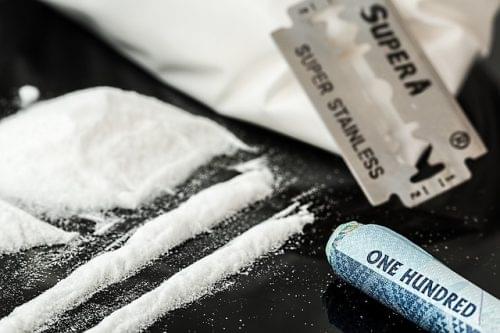Cocaine Addiction
What are the most common signs and symptoms? Request a Callback
By John Gillen - Last Updated: December 22, 2023
Clinically Reviewed by Dr Robert Lutaaya. All information on this page has been reviewed and verified by a certified addiction professional.

What Is Cocaine?
Cocaine is a stimulant and a highly addictive illicit substance and abuse can lead to cocaine addiction. Cocaine is currently a Class A controlled substance in the United Kingdom. Cocaine is a fine powder that commonly inhaled or intravenously injected.
The manner in which you consume cocaine affects how your body and mind is affected by this dangerous drug.
When cocaine is snorted, you will likely experience a range of short term symptoms. These symptoms include: the loss of smell, difficulties swallowing, nosebleeds and hoarseness.
Cocaine is one of the most dangerous and misused drugs worldwide. Cocaine addiction is more often than not a result of repeated cocaine use – and the health issues it comes with are also well documented and extremely dangerous to you.
The drug is also known to have a dangerous effect on your personal life. Many families, relationships, marriages and friendships had been broken through cocaine addiction.
Are you someone who fears that their life is being affected through cocaine abuse – but you cannot stop taking the drug? It is never too late to get help. At Ocean Recovery Centre, we offer cocaine addiction treatment to help you free yourself from the shackles of cocaine addiction.
Cocaine Addiction Treatment options such as the ones we offer at Ocean Recovery Centre have been developed to help control addictive behaviours by flushing out harmful toxins from your system while using effective therapy and counselling to help the mind recover.
The psychological impacts of cocaine addiction
When your addiction to cocaine progresses, you will likely experience a range of personality and behavioural changes. These changes include the development of mental health problems such as paranoia, anxiety, irritability and restlessness.
Eventually, you may develop a condition known as paranoid psychosis. If this condition arises, you will begin to ‘lose touch’ with reality. You will also begin to experience symptoms known as ‘auditory hallucinations’. This is when you begin to hear voices and other sounds that are not real.
The physical impacts of cocaine addiction
Cocaine addiction also negatively affects you from a physical standpoint. Cocaine is toxic to skin and will cause death of tissue. This is known to develop into a deadly infection known as gangrene. This is particularly a risk if you consume cocaine via swallowing. Cocaine will begin to damage tissue in bowel causing potentially deadly ulcers.
Cocaine additionally is also known to cause strokes or cardiac arrest. The vast majority of cocaine-related deaths are due to cardiac arrest. Cocaine makes the heart swell. This may lead to respiratory arrest and death. This may occur even when cocaine is consumed as a one off. However, those of you who are addicted to cocaine run a particularly high risk of experiencing a heart attack, stroke or seizure due to your chronic cocaine use.
Health implications of cocaine addiction

Below, we list the most common health implications linked to cocaine addiction:
- Digestive problems
- Heart problems
- Respiratory problems, including respiratory failure
- Damage to the nervous system causing a stroke
- Contacting infectious diseases such as HIV
- Infection of the skin, including gangrene
- Allergic reactions
- Death
Cocaine’s effect on the human brain
Cocaine addiction arises in much the same manner as any other drug addiction. The key cause of cocaine addiction is due to the effect cocaine has on the brain. When you consume cocaine, you will experience pleasure because cocaine stimulates a neurotransmitter known as dopamine.
Evolution developed dopamine to encourage living creatures to engage in activities that promote survival. These activities include drinking water, eating food and mating. However, cocaine hijacks this system and long term cocaine addiction permanently affects this system. This is why those who were once addicted to cocaine may experience urges to relapse even decades into their recovery.
Cocaine blocks the re-uptake of dopamine. This then means you must continue to take cocaine in order to experience normal feelings of happiness and contentment. You also build up a tolerance to cocaine. This means you must take ever greater quantities of cocaine in order to experience the desired effects. Increasing the amount of cocaine you consume further increases the risk of experiencing a range of negative physical and psychological symptoms linked to cocaine use.
Cocaine Addiction Treatment – How It Works:
The first step of cocaine addiction treatment must be done by yourself. Step one is realisation. Many people who struggle with cocaine dependency will not admit that they indeed have an issue with drugs. This is due to the fact that addiction is still a stigma and many people feel that they would be considered weak if they admit that help is needed.
However, addiction is a disease – one that can happen to anyone. Addiction does not discriminate – an often-quoted sentence that is indeed true. People from all walks of life struggle with addiction – with no bearing on their strength, social standing or financial situation.
Once you are ready to admit you have a cocaine problem- give us a call. Once you have agreed to join our programme – we move on to the next step of your cocaine addiction treatment, detox.
Cocaine Addiction Treatment: Detox
The process of detoxification means to cleanse your body from a certain substance. For cocaine, this could take some time to get rid of the drug. It can stay in your urine for 4 days, and in your blood for up to 48 hours. Withdrawal symptoms are quite difficult for many addicts – as it can lead to some uneasy feelings such as ; runny noses, anxiety and depression. We employ medical professionals who are able to administer medication where needed – and make the normally uncomfortable rehab period a lot more comfortable.
After detox, we move on to CBT – cognitive behavioural therapy. This will allow you to change your way of thinking and coping with drug cravings. You will also be treated for co-existing psychological issues at our cocaine addiction treatment centre.
Cocaine Withdrawal symptoms
The withdrawal from substances such as cocaine can involve both physical and psychological withdrawal symptoms which range from mild to severe. Amongst the most common symptoms are
- Exhaustion
- Slow thinking
- Increased appetite
- Restlessness
- Tremors
- Difficulty concentrating
- Cravings for Cocaine
It is important that individuals undergo withdrawal under the supervision of trained medical professionals.
Why not give us a call today to find out more? Alternatively, you could also visit some of our other pages for more information.
- Cocaine Rehab
- Drug Rehab
- Cocaine Detox
- Cocaine Addiction
Contact Us
94 Queen's Promenade, Blackpool, FY2 9NS, Blackpool, FY2 9NS
Landline: 01253 847 553
Email: info@oceanrecoverycentre.com
Start your Recovery - Call us now
John Gillen
- Author
- Last updated: December 22, 2023
John is one UK’s leading professionals in the addiction recovery industry. Pioneering new treatment techniques such as NAD+ and ongoing research into new therapy techniques such as systematic laser therapy, John is committed to providing the very best treatment for people throughout the UK and Europe. During his extremely busy schedule, John likes to regularly update our blog section with the latest news and trends in the industry to keep visitors to our site as well informed as possible on everything related to addiction treatment.

Dr Robert Lutaaya
- Clinical Reviewer
- Last reviewed: December 14, 2023
Additional Resources
Cocaine Addiction Treatment
Cocaine Addiction Treatment Resources
Other Addictions Treated
Request A Callback
Enter your phone number and a member of our team will call you back to discuss your recovery.
"*" indicates required fields
Cocaine Addiction Treatment
Cocaine Addiction Treatment Resources
Other Addictions Treated
Request A Callback
Enter your phone number and a member of our team will call you back to discuss your recovery.
"*" indicates required fields
Our Blogs
-

How Do Alcohol Tags Work?
You might have heard of alcohol tags. They’re also known as sobriety tags. These devices are designed to monitor alcohol consumption and may be required in certain circumstances to help ensure court-ordered sobriety. The thought of being ordered to wear an alcohol ankle tag may feel intimidating or confusing, but in this article, we’ll tell
-

Our CQC Inspection: Transparency, Pride, and Our Commitment to You
This blog post is based on our CQC inspection conducted on September 28, 2021, and published November 17, 2021. We believe in transparency and are committed to sharing both our successes and our areas for improvement with everyone we serve. We’re proud to share the results of our recent Care Quality Commission (CQC) inspection with
-

Loneliness at Christmas: How to Cope
Loneliness is something that people deal with all year round. For some reason, though, loneliness can feel more intense at Christmas, a time that is supposed to be filled with celebration and joy. Last year, over 9 million adults in the UK worried about being lonely at Christmas and it is now a continuing problem
-

What Role Could AI Play in Treating Addictions?
Healthcare and medicine have always revolved around technology. Now, the drug and alcohol addiction treatment sector is no different, as advances in technology are revolutionising care in this country. Last year, the government announced pilot schemes for wearable technology, virtual reality and artificial intelligence to be used in recovery. The explosion of AI in mental
-

Is Addiction Considered a Chronic Illness?
A study by Bupa in 2025 found that over half of UK workers admitted to having struggled with some form of addiction. It is a more common problem in society than we like to admit, and many people don’t let others know they are struggling because of the stigma and language around addiction. How we
-

Life After Addiction: Rebuilding Your Career
Recovery from addiction is a hugely transformative experience and gives you the opportunity to reclaim control of your health, relationships and future. One of the biggest aspects of life after addiction is rebuilding a career. For many, returning to work or starting a new professional path can feel daunting, but it’s also an important part
-

How Are Addictions Formed?
Unfortunately, addiction, in all its forms, remains a persistent problem in this country. According to the latest government figures, 3.1% of people are struggling with drug addiction. In the most recent numbers released, it was estimated that 608,416 adults were addicted to alcohol. Though there is a growing understanding and empathy for people suffering from
-

How Do I Know if I’m an Alcoholic?
For many people, drinking is a normal part of social life. A glass of wine with dinner, a pint at the weekend, or a toast at a wedding. All seemingly harmless. But for some, drinking becomes more than just a way to unwind. It can slowly take over daily life, relationships, work, and mental health.
-

How Long Will Fentanyl Stay in Your System?
Heroin addiction is a continuing problem in society. America has, for many years, been in the grip of an opioid crisis, fuelled by the rise of fentanyl. Problems around opiates exist in the UK, with 2,551 deaths involving them, according to the latest figures. People can take fentanyl knowingly, or it is in drugs such
-

How Does Alcohol Affect Menopause?
Menopause is a normal part of ageing that all women have to deal with. Many changes happen during these years, and they can be difficult to deal with. If you are struggling with an alcohol addiction or drink casually and are worried about how alcohol affects menopause, you should educate yourself. Going through these changes